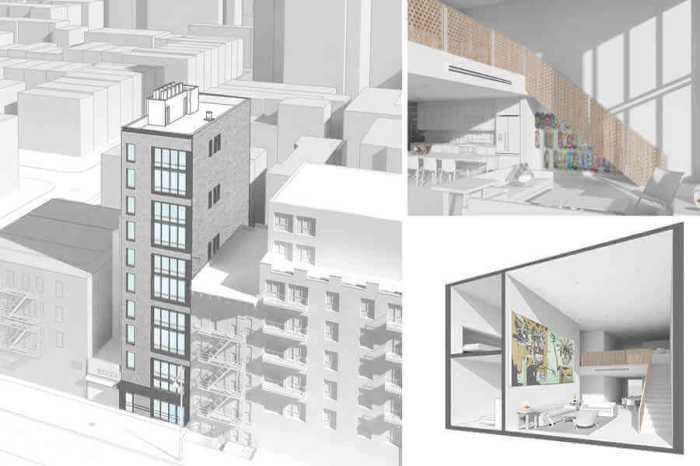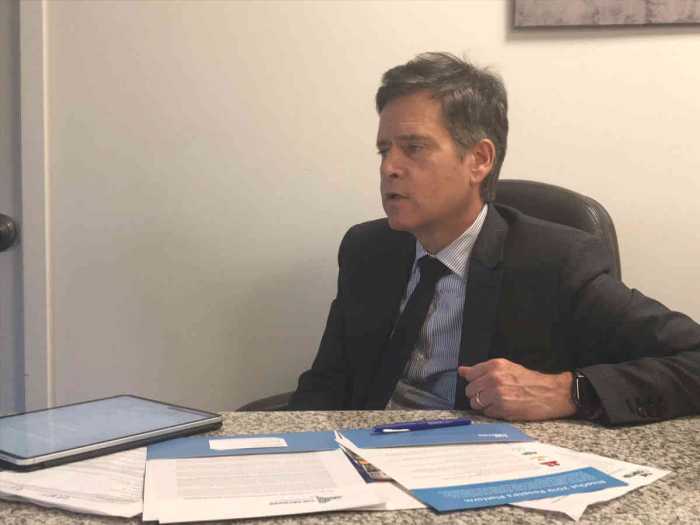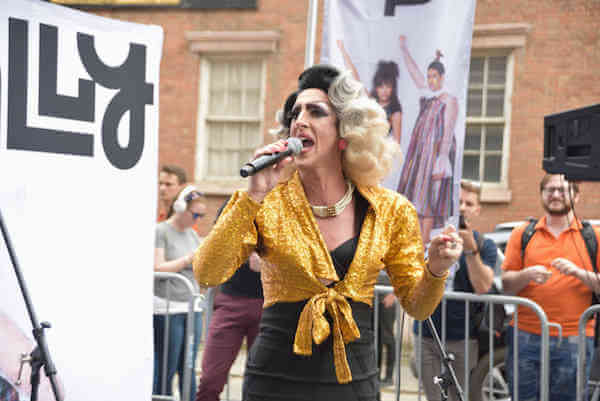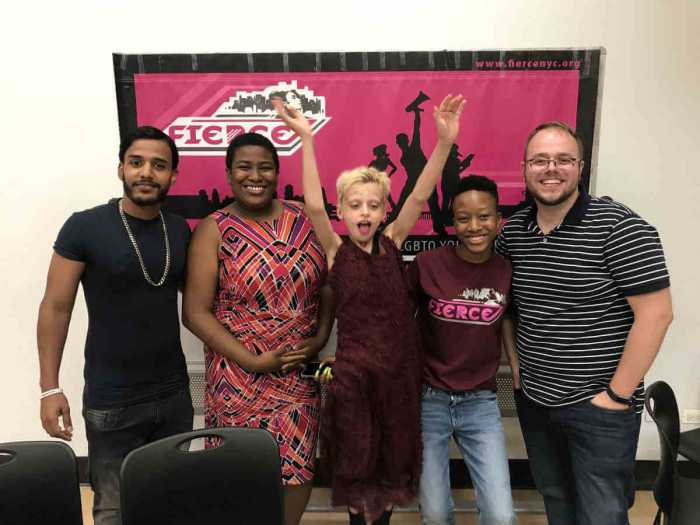BY DAN HECHING | Sometimes, justice can be poetic on many levels. An LGBT-affirmative organization has expressed interest in acquiring a notoriously homophobic Harlem church that is currently over $1 million in debt, and the community is all for it.
The “Hate Pastor of Harlem” — one James David Manning of the Blood of Jesus Atlah World Missionary Church on 123rd Street and Malcolm X Boulevard — has been spewing homophobic and anti-Muslim rhetoric for more than two years, to anyone who would listen as well as on an attention-getting sign on his church’s corner. If it weren’t for just how outrageously virulent and hateful the language posted there is, one might think that Manning is simply an attention-seeker. His vanity is particularly grandiose, and he is more than willing to be interviewed on camera by one and all, his office even equipped with camera-ready backdrop and lights.
Now, it has been revealed that Atlah has unpaid debts in excess of $1 million, including water and sewage charges owed to the city, in addition to overdue taxes and other liabilities. The church is also responsible for fines due to the Landmarks Preservation Commission, which may soon surpass $13,000, according to the LPC. Due to Manning’s failure to show up in court or respond to notices, the property is in foreclosure, and an auction is set for February 24.
Local community supports converting a church into transitional housing for LGBT youth
Manning insists he is not required to pay for these utilities because his church is tax-exempt, but when contacted, he could not readily provide information as to when he may have applied for the exemption. Furthermore, that particular status is reserved only for churches that use their space exclusively for public worship — Manning has mentioned repeatedly that his church provides additional services as well, outside of prayer.
The poetic part is this: Local community members offended by the church have been organizing in support of the Ali Forney Center acquiring the building at auction to provide its clients with additional housing. Ali Forney, the largest national organization serving the housing and social service needs of homeless LGBT youth, has a drop-in center on 125th Street and Frederick Douglass Boulevard, just three blocks away from the Atlah church site.
Carl Siciliano, executive director of AFC, is cautiously optimistic that his organization’s efforts, which are backed by local community groups like Love Not Hate, will pay off.
“I’m gratified by the amount of attention this has received,” he said. The end goal shared by AFC and other local community groups is focused on the fundraising campaign Harlem No Hate, which set a goal of raising $200,000 toward a down payment on the building at auction. Siciliano said his group will then leverage that sum to “trigger conversations with larger donors.” As of the morning of February 9, the campaign announced it had reached its goal.
It’s about “bringing attention around the issue, and showing broad public support,” Siciliano said. He went on to mention that four different entities have approached AFC as potential partners in this project, in the collective hope of seeing the church, currently a site of so much hurtful rhetoric, turn into a place of community support and inclusion for LGBT young people.
It all depends on the auction, though. In most foreclosure auctions, no minimum bid is set and the sale is public, so it can be anybody’s game. But conceivably, the city will make sure the property is not sold for a sum lower than the lien against it. Which means: someone’s gotta pony up.
Siciliano, for one, is unruffled.
“This really shows our viability as a contender,” he said of the contributions made thus far in support of the effort to grab the church at the auction.
An instrumental help in the cause is neighbor Stacy Parker Le Melle, founder of Harlem Against Violence, Homophobia and Transphobia, who has had to deal with Atlah’s offending signage from the first — right outside her front door. Even before the news of the impending foreclosure, Le Melle was working to support nearby Ali Forney.
“These are mostly small donations from people in the neighborhood,” she said about the $20,000 she has helped raise over the last two years. Of AFC, Le Melle said, “they’re the biggest show in town as far as helping LGBTQ youth who are homeless or need help. So we felt like we’ll give them the money and they’ll help the kids who have to walk down the street and see this kind of hate messaging.”
Now, of course, the cause has grown much bigger, and Le Melle along with her constituents would love to see the church acquired by AFC.
“When the news [of the foreclosure] broke… we immediately thought, ‘The Ali Forney Center!’” Le Melle said. “Honestly I think we’re making history to be the first neighborhood group to say, ‘Please bring in transitional housing into our neighborhood!,’ but the AFC isn’t just any kind of transitional housing… they really care for their clients.”
Siciliano also sees it as a no-brainer. Through his experience with Ali Forney, which he founded in 2002, he’s seen that a major challenge in procuring transitional housing — and getting the city on board with it — is winning local neighborhood approval. But in this case, the neighborhood would gladly welcome such a change, if it meant removal of the church and its pastor’s hate-packed sign.
“If you’ve got the local neighborhood asking for it, it’s a rather remarkable situation,” Siciliano said. “This was instrumental in evaluating the pro’s of going for this space.”
The proposed acquisition would also make sense on a practical level; there are other potential sites that the Ali Forney Center was already interested in acquiring for its young clients, but none within walking distance of the its drop-in center, a nexus point of the organization’s activities.
Should AFC not prevail in securing the building at auction, Siciliano has pledged to use the money raised “to increase its housing and vocational services for homeless LGBT youth in another site.”
The Rivers of Living Water Ministries, an LGBT congregation led by African-American Reverend Vanessa Brown and Bishop Joseph Tolton, is without a home and has also established a fund to try and secure the property.
To the untrained eye, the problem Atlah church presents — homophobia displayed so blatantly, and by a religious institution no less — might seem outlandishly out of place for 2016 Manhattan. But the Ali Forney Center’s central mission serves as a reminder that there are still massive problems for LGBT youth — and by extension, the community as a whole — that remain insidious even in New York.
“Ali Forney was murdered 10 blocks from there,” said Carl Siciliano of his foundation’s namesake, who he said used to sleep on the hill in Marcus Garvey Park down the street from the Atlah church. “This is very visceral, very real and emotional for me.”
And while Ali Forney died back in 1997, the murder of young transgender woman Islan Nettles occurred less than three years ago, also in Harlem. The problem is now, the Harlem community seems to agree, and prompt removal of language in support of the murder of young people is vital.



































